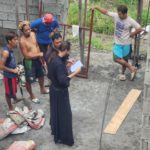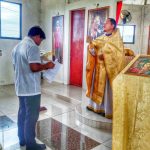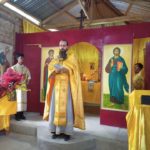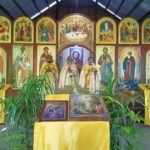May 2 is the day of memory of the people’s favorite Saint blessed Matrona of Moscow (Nikonova). Mother Matronushka, as the faithful affectionately call her, is prayed for in illnesses, life’s troubles, when it does not get along with work, school, housing, and under persecution. The fame of Mother Matrona has long crossed the borders of Moscow, and indeed of all Russia. Thousands and thousands come to the capital to visit the relics of the Saint, in search of help and intercession and many receive her assistance! The Shrine with her relics is in the Pokrovsky monastery.
Stories about miracles that occurred through the Saint’s prayer have long been published in separate books. Matronushka was born in 1885 in Tula province, and passed to the Lord on May 2, 1952 in Moscow.
A poor peasant family, the Nikonovs were already growing 3 children, and the mother, afraid that she would not be able to feed one more child, decided to give it to an orphanage after birth – there was no question of killing the child in the womb. But shortly before giving birth, she dreamed of her unborn daughter in the form of a wonderful white bird – with a human face and closed eyes. The bird landed on the woman’s right hand. God-fearing Natalia regarded the dream as a sign and gave up the idea of shelter. The girl was born blind, and the child had no eyes at all, the eye sockets were closed with tightly closed eyelids – like a white bird that the mother saw in a dream. Soon it was discovered that the blind girl was given a “spiritual” vision, linked with the gift of foresight, miracle-working and healing.
From an early age, Matrona was rarely seen playing in the courtyard with other children, but she often visited the temple and spent almost all her time in prayer, at the icons. Children had violent games: they whipped the blind girl with nettles, knowing that she would not respond to the offender. Or they put her in a hole and laughed as she tried to get out of it. The helpless child was bullied because she behaved strangely: she said things incomprehensible, such as are not expected from a child. However, the neighbors soon noticed that the blind, helpless girl is not only surprisingly astute, but also has the gift of foresight. Moreover, Matrona predicted not only events from the life of her native village, or nearby villages, but in an allegorical form, she prophesied about the fate of the Royal family, the whole of Russia. Unfortunately, all these prophecies were fulfilled.
Having heard about the girl’s foresight, they reached out to the Nikonov house for advice and help, so Matrona turned from a burden into the main breadwinner of the family. At the same time, the blind girl discovered the gift of healing.
When Matronushka was seventeen years old, the girl suffered a misfortune – her legs got paralyzed, and for the rest of her days, the blessed one remained sedentary and completely dependent on others. In 1925, Matronushka moved to Moscow. The fact is that Matrona’s older brothers, who joined the Communist party, were afraid that the presence of the blessed one in their house, to whom people flocked all day long, would cause reprisals from the authorities. Feeling sorry for the old people-parents and brothers, Matrona leaves her native home. Matronushka begins a long period of homelessness. She never had a corner of her own in the capital – she wandered around relatives, acquaintances, some poor houses and basements.
An eyewitness of her life once found this picture: Matronushka was lying with her face to the wall and could not turn around – during the night her hair froze to the wall. Without a residence permit, Matrona many times, literally by miracle, avoided arrest, moving out of other people’s apartments shortly before police came for her.
They told how once a policeman came for Matronushka, and she said to him: “Run home quickly, I, blind and not walking, will not get away from you, and you have trouble at home! Run, or you won’t have time!” The policeman obeyed, ran home, and there his wife was burned by kerogaz: barely managed to get to the hospital. When the policeman was asked the next day why he did not arrest the blind woman, he replied that he would not follow her – “because if it were not for this blind woman, I would have been left without a wife.”
In Moscow of that period there were many unhappy, lost, and sick people. Having heard about the blessed one, many went to her for help, and received it. Matronushka received up to forty people a day. During the war, she was approached not only for healing, but also by those who wanted to learn about the fate of their loved ones. Completely illiterate, she seemed to know everything.
Outwardly, the Matrona’s life was monotonous, devoid of the pathos of the feat – she received people during the day, and prayed at night. Like many ascetics, the blessed one never really went to sleep – more often she just dozed, lying on her side, on her fist. With tiny, as if children’s hands and feet, sitting on a bed or chest, with a kind, bright face and a gentle voice-this Matronushka was remembered by people. She herself was in great pain, and seemed to know neither fatigue nor annoyance. It is easy to love when you are doing well, and you are ready to share your joy with both near and far. But how difficult it is not even to love, but just to tolerate others if something in your life does not add up or you are ill. One can only guess what it cost Matronushka to receive the sick and suffering from day to day, and not just to accept, but to listen and give advice. Matronushka could embrace those who came to her with such love that this alone healed them. In other words, there was so much love in her that, as a sufferer herself, she found the strength to pity others.
How can you learn to love like that?
Once, in a conversation with the blessed one, someone, justifying his intemperance, said: “Mother, it’s all nerves.” “What nerves: in war and in prison there are no nerves… You must control yourself, endure.” Or even for our edification: “If the old, the sick, or those who are out of their minds will say something unpleasant or offensive to you, then do not listen to them, do not get annoyed, but just help them.”
M. Gorodova











